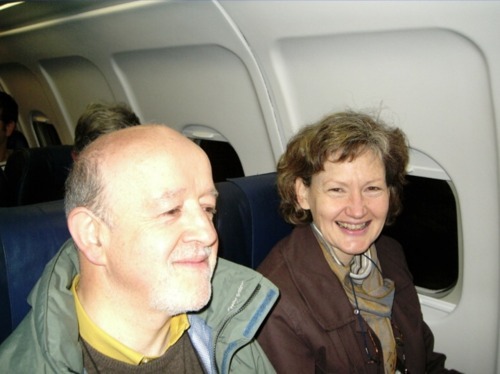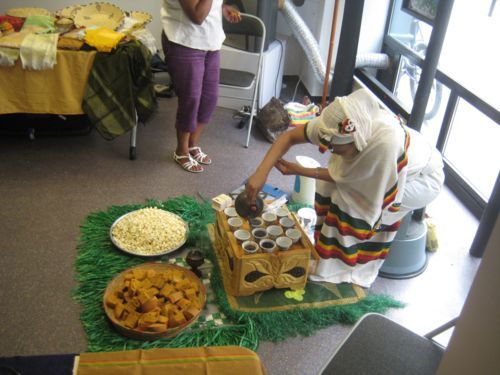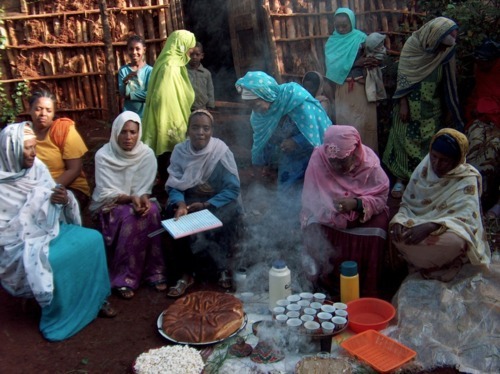Adoption

They adopted a son, and then they adopted a country.
André and Nicky Orluc adopted their son Nathan from Ethiopia when he was four years old. Of the journey before they picked him up at the airport – the mountains of paperwork, the swamps of bureaucracy – I do not know, but of the adventure since, I have become familiar by virtue of being co-opted into their organization, TESFA, for a few days to help them with a two day conference on microfinance they are hosting in Paris’ 7th arrondissement. I have become their “technology specialist,” creating, connecting, and coordinating their multimedia for the event.
Nathan brought such vitality and energy into their life, they had to see the land that gave their son birth, so they boarded a plane and flew to Ethiopia. They knew no one, had no agenda, and could not speak the language, but they went, open to whatever God wanted to show them there.
I’m sure within a few hours of arriving in Addis Ababa, they knew half the people in the country. The French are known for being standoff-ish and aloof. André is the exception. He is as boisterous and outgoing as anyone I have ever met, stopping frequently to talk to everyone from the mendicant digging through the garbage of the finest restaurants in Paris to former French President Jacques Shirac who eats at a table nearby (true story). André has only one prejudice – people. He loves them all and wants them all to know it.
His wife, Nicky, is from Ardmore, Oklahoma, a town who’s proximity to my own hometown is a coincidence greatly esteemed by André. She is the calm to André’s storm, but her warmth and openness rival André’s in every way. If André’s effusiveness makes you feel welcome, Nicky’s attention makes you feel at home.
On that first trip to Ethiopia, they traveled, they saw, they fell in love. They saw in Ethiopia a people distinct in the world. They were taken with the striking high country where most of the Ethiopians live and farm and with the active, volcanic rift valley which enriches the Ethiopian soil to produce some of the best coffee in the world. Interestingly, it is widely believed that the Ethiopians were the first people to drink coffee, and when you taste their sublime brew and watch the careful ceremony that yields it (as I did yesterday), you believe it too.

Nicky and André were also struck by the poverty faced by the Ethiopian peoples and by poverty’s henchmen, hunger and disease. André is a doctor and a man full of ideas, so they began praying and thinking about what they might do to help some of these beautiful people. They initially tried to import medicines to one of the medical groups they met on their trip, but the life-giving pharmaceuticals violated international embargoes and could not be imported into Ethiopia.
Two years later, friends of theirs were working towards adopting a daughter of their own from Ethiopia. They went through the same processes, scaled the same mountains of paperwork, and jumped through the same bureaucratic hoops, and then, mere weeks from the arrival of their daughter, it was discovered that the girl had AIDS and was ineligible for adoption. The thirteen year-old girl died a few months later.
True to their love and energy, Nicky and André started an AIDS prevention program with a group of other doctors. Direct treatment was all but impossible in the Ethiopian environment, but education is easy to deliver. After a few years of this, the program became mired in bureaucracy as well, and the Orlucs began looking for some other way to help people.
People remain the central focus of André and Nicky’s work. Everything is based on relationship, and when government agencies and humanitarian power structures begin to filter their love, they pull out and find another way to directly feed the hungry and heal the sick. They are like Christ amongst the lepers, daring to walk with those the authorities are too afraid to touch.
They found their way with a group of Ethiopian women in the Northern part of the country.
The Orlucs had read about Muhammad Yunus’ work with microfinance in Bangladesh, and they decided to try something similar in Ethiopia. Microfinance is a lending program where a poor person is given a very small loan, like two or three dollars, and they are expected to pay it back, without interest, at their leisure. Though small, the amount makes a huge difference in the lives of the impoverished as they use the money to start money-making businesses. Microfinance has proven to be hugely successful in getting people out of poverty, because unlike with a simple hand out, by requiring the loan to be repaid, the poor person is required to change the way they live and therefore lift themselves out of impoverishment. The program also involves microsaving as well, teaching the borrowers the importance of planning for the future, a future they may not have believed in before.
André and Nicky appreciate microfinance because the practice is rooted in community. Instead of giving loans to a single person, they only lend to groups. This creates a system of accountability among the group members. The money then becomes secondary to the relationships that are built and strengthened amongst the co-op, and instead of a single person rising out of poverty, an entire community is resurrected.
Working with an Ethiopian church, they identified already existing relational communities amongst the Ethiopian poor, believing that a group of people already committed to one another would be all the more likely to strengthen through the process. They settled on a group of women, because in similar situations, women have proven to be more responsible, smarter, and more devoted to their community than men. Through the church, they gave the group a small loan, and then watched as the women used the money to help themselves and every friend and family member in their greater community. The experiment has been a great success, and André and Nicky are expanding their relationships into other communities in Ethiopia.

And it all started with a single daring act of love – an adoption. The love André and Nicky know in Christ prompted them to love Nathan. His love for them fed back in their lives until all the love could not be contained and had to spill out to include a country as well. Every time something has tried to hold back the tide of love, be it embargoes or death or bureaucracy, love finds a way to breach the dam and keep spreading.
If you want to know more about the Orlucs and their foundation, TESFA, visit their website, and feel free to contact them as well through the link at the top of the screen.
Gene Kelly Was Here
These blog posts were all written in the summer of 2011. They chronicle my time in Paris completing an internship as part of my studies at Fuller Seminary. I worked at an art gallery run by missionary-artists ministering to other Parisian artists and got to know the missionary-artists working there.
I am including them here for you to read because I think they work well together as a series. I wrote them as a kind of narrative collage about what it means to be a practicing artist whose first commitment is to Christ and who seeks to share the love of Christ with other artists.
